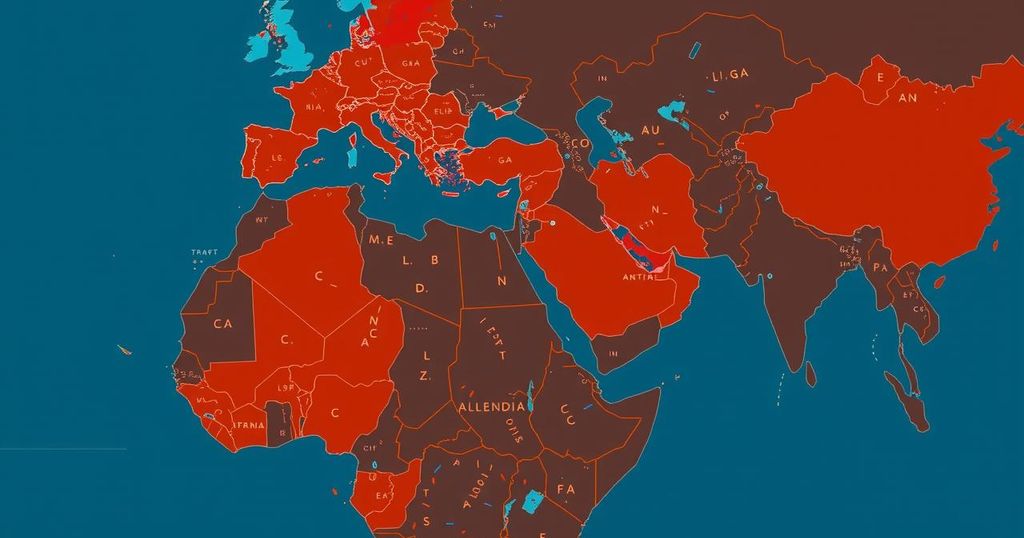Zimbabwe’s ruling party, Zanu-PF, faces accusations of meddling in elections in Botswana, Namibia, and Mozambique, with opposition parties objecting to its perceived interference. Allegations include campaign support for local parties and voting by Zimbabweans in foreign elections, raising concerns over sovereignty and electoral integrity within the region. Government officials deny these claims, asserting legitimate regional partnerships.
Zimbabwe’s ruling party, Zanu-PF, finds itself embroiled in controversies stemming from allegations of election interference in neighboring countries, notably Botswana, Namibia, and Mozambique. Opponents in these nations accuse Zanu-PF of meddling in their domestic electoral affairs, directly linked to the party’s alliances with local ruling parties. Zanu-PF, one of the vestiges of liberation movements still in power within Southern Africa, asserts its role as a bulwark against what it terms neo-colonial influences re-emerging in the region. It has actively supported the Front for the Liberation of Mozambique (Frelimo) by dispatching campaign teams to bolster their efforts ahead of the contentious October 9 elections. Additionally, Frelimo was permitted to organize campaign rallies within Zimbabwe as they sought to engage the diaspora vote, particularly from Mozambicans residing there due to historical civil unrest. In Botswana, Zanu-PF operatives have publicly endorsed the Botswana Democratic Party (BDP), led by President Mokgweetsi Masisi, as they prepare for elections slated for October 30. Meanwhile, in Namibia, opposition demonstrations have emerged against a South African firm involved in printing ballots for the forthcoming elections, which protestors allege is linked to President Emmerson Mnangagwa. Earlier this year, Zanu-PF convened a meeting of liberation parties within the Southern African Development Community (SADC), expressing a desire to collectively resist perceived threats from former colonial powers. At this gathering, they sought to unify various parties, including the African National Congress (ANC) of South Africa, Frelimo, BDP, and others to withstand undue external pressures. Former Botswana leader Ian Khama condemned Zimbabwe’s perceived interference, warning of the implications if Zimbabweans were allowed to influence the elections via their participation in Mozambique. “Remember (President) Mnangagwa went on national television and promised to help (President) Masisi win elections. The ruling party is preparing to rig the general election by using Zimbabweans to vote here in Botswana,” he stated. Job Sikhala, an opposition figure from Zimbabwe, urged SADC to intervene, asserting, “Zanu-PF’s push for regional recognition has reached desperate levels. They are arrogantly coming out in the open declaring that they are assisting… to make sure their friends in Botswana win the forthcoming elections. That’s interference in the domestic affairs of a sovereign neighbouring state. SADC can’t be silent.” Zimbabwe Government Spokesman Nick Mangwana refuted these allegations, claiming, “Zimbabwe works with any government democratically elected into office in the region. We only participate in regional elections under the ambit of SADC observer missions… we have a lot of clout, but it is preposterous to allege that Zimbabwe is the country that determines who governs every country in the region.” In past instances, Zimbabwe has accused foreign states, like Zambia, of attempting to influence its elections, highlighting a reciprocal pattern of political accusations. Moreover, President Mnangagwa faced scrutiny after he prematurely congratulated Frelimo on their electoral victory before official results were declared, further fueling allegations of undue influence in Mozambique’s electoral process. As the current SADC chair, Zimbabwe is under pressure to mediate the escalating electoral dispute in Mozambique, where opposition factions are protesting alleged result manipulations favoring Frelimo. Piers Pigou of the Institute for Security Studies observed that Mnangagwa’s actions raise concerns about the integrity of SADC processes, shedding light on the complex political dynamics within the region.
Zimbabwe’s political interference allegations arise amidst its enduring relationships with ruling parties in neighboring Southern African nations, where it continues to assert its influence as a resistance against colonial legacies. The historical context includes Zimbabwe’s backing of liberation movements and its positioning as a leader among pro-independence parties within SADC.
The situation highlights Zimbabwe’s contentious role in regional politics, where accusations of interference have provoked significant dialogue about sovereignty and electoral integrity in Southern Africa. Statements from political leaders and observers alike underscore the pressures of maintaining political legitimacy in a landscape sensitive to foreign influence and historical legacies. With Zimbabwe’s double role as an active participant and the SADC chair, the implications of its actions will require careful navigation to avoid further escalation of tensions among neighboring countries.
Original Source: www.theeastafrican.co.ke






